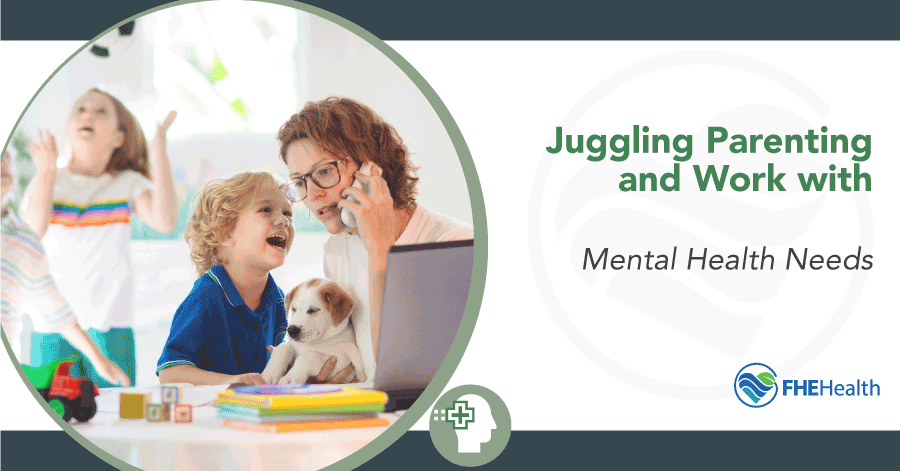
Parenting is a hard job. Raising a child is 24/7; there are no breaks or vacations from being a parent, and there’s no way to clock out when things get tough. Being a parent is amazingly rewarding and one of the most defining experiences in life, but that doesn’t mean it leads to a lifetime of bliss. The road is rough, from sleepless nights in infancy to boundary-pushing during teen years.
Many parents feel that after they have children, their primary focus needs to be on childcare rather than personal needs. In many ways, this makes sense. However, this intense focus can often mean neglecting things, like mental health, for parents, leading to burnout and decreased overall well-being. It’s a common misconception that prioritizing personal needs equates to being a less devoted parent, when in reality, the opposite is often true.
Gauging Your Own Mental Well-Being
With parenting problems, work stressors, and a lack of outlets for stress relief, trouble maintaining mental well-being is completely understandable. However, all of the pressures of parenting can put mental wellness on the back burner — and that’s not okay. Failing to recognize and address mental health needs in parents early can lead to an overall decline that will be far more difficult to resolve.
To gauge whether you may be experiencing significant issues in need of attention, ask yourself honestly if:
- Your temper seems shorter than usual
- You are unable to focus properly on tasks that once came easily, like routine work duties
- You dread getting out of bed or handling simple tasks
- You are falling behind on normal household chores, like doing the dishes
- You cry more than usual
- You and your spouse are fighting more than usual
- Normal activities with your child suddenly seem exhausting or unbearable
- Your tolerance for physical touch has decreased
- You are fatigued beyond a normal level
- Your hair is falling out
- You no longer care about things that previously mattered, like performing well at work
- Your favorite activities are no longer enjoyable
If your answer to more than one or two of these questions is yes, you may want to take steps to put more focus on your own health.
How Can You Balance Parenting and Mental Health?
As a parent, one of your primary roles is serving as a helper. You are there to answer questions, help with basic life tasks, assist with learning, make meals, and manage hygiene routines. However, when you’re not your best self, you can’t effectively serve others. If mental health is standing in the way of normal life, it’s time to take action and prioritize your mental well-being.
Seeking Professional Support and Self-Care Strategies
First and foremost, parents with a mental disorder or those who are experiencing signs of one should consider speaking with a professional. Many counselors and therapists now offer video sessions, making it a little easier to find time for therapy.
It’s also important to intentionally carve out at least a little time each day or week to do things you genuinely enjoy. This form of self-care helps to buffer stress, replenish your energy, and remind you of your identity beyond “parent.”
Here are some self-care activities that busy parents can incorporate:
- Savor a warm beverage
- Practice deep breathing
- Listen to music
- Read a book
- Step outside for fresh air
- Watch a movie
- Engage in a creative pursuit
- Take a walk
- Connect with friends
- Take a warm bath or shower
- Practice a relaxation technique
- Simply do nothing
Asking for and Accepting Help
It’s also okay to ask for help. Don’t be afraid to ask a spouse or partner to take on more of the load, even temporarily, so you can improve your situation. Or, if the budget allows it, consider hiring a babysitter to work with your child periodically during the week. Just a few hours away from the intense demands of parenting can do wonders for getting your stress under control.
Your Well-being Matters for Your Child’s Well-being
As a parent, you love your child and want to do whatever it takes to do whatever it takes to make their life as happy and healthy as possible. But that doesn’t mean you need to neglect yourself. Make sure you’re actively doing what you need to do to stay healthy – both physically and mentally – in the face of the ongoing demands of parenthood. Your child will ultimately benefit from having a well-supported and emotionally healthy parent.
Finding Mental Health Support for Parents
If your or a family member’s mental health problems are too severe to manage independently, FHE Health can help. Our mental health treatment programs provide care for a wide range of conditions in a safe, secure environment. Contact us today to learn more about how our programs can make a difference for you in balancing parenting and mental health.






